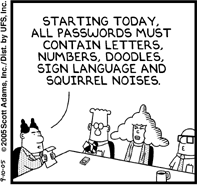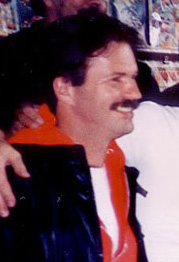
Dilbert is an American comic strip written and illustrated by Scott Adams, first published on April 16, 1989. It is known for its satirical office humor about a white-collar, micromanaged office with engineer Dilbert as the title character. It has led to dozens of books, an animated television series, a video game, and hundreds of themed merchandise items. Dilbert Future and The Joy of Work are among the best-selling books in the series. In 1997, Adams received the National Cartoonists Society Reuben Award and the Newspaper Comic Strip Award for his work. Dilbert appears online and as of 2013 was published daily in 2,000 newspapers in 65 countries and 25 languages.

User Friendly was a webcomic written by J. D. Frazer, also known by his pen name Illiad. Starting in 1997, the strip was one of the earliest webcomics to make its creator a living. The comic is set in a fictional internet service provider and draws humor from dealing with clueless users and geeky subjects. The comic ran seven days a week until 2009, when updates became sporadic, and since 2010 it had been in re-runs only. The webcomic was shut down in late February 2022, after an announcement from Frazer.

Achewood is a webcomic created by Chris Onstad in 2001. It portrays the lives of a group of anthropomorphic stuffed toys, robots, and pets. Many of the characters live together in the home of their owner, Chris, at the fictional address of 62 Achewood Court. The events of the strip mostly take place in and around the house, as well as around the town of Achewood, a fictional suburb.

Howard Cruse was an American alternative cartoonist known for the exploration of gay themes in his comics. First coming to attention in the 1970s, during the underground comix movement with Barefootz, he was the founding editor of Gay Comix in 1980, created the gay-themed strip Wendel during the 1980s, and reached a more mainstream audience in 1995 when an imprint of DC Comics published his graphic novel Stuck Rubber Baby.

Patrick Sean Farley is a freelance illustrator and Web page designer. Known as a pioneer of webcomics as a medium, Farley works out of Oakland, California.

Jerry A. Mills was an openly gay cartoonist known for his comic strip Poppers, which is credited as one of the first comic strips to develop multi-dimensional gay characters. Scholars have stated that while earlier comics had relied on stereotypes such as the nelly queen or muscleman, Mills presented his characters with lives beyond the stereotypes. His work is also credited as having helped shape comics for the LGBTQ+ community and its members.
Oh My Gods! is a webcomic written and illustrated by Shivian Montar Balaris. It deals with the Neopagan, Pagan, and Wiccan faiths. The interaction of followers of these faiths with Christian fundamentalists and followers of other religions is the main concern of the story.

David M Willis is an American web cartoonist currently living in Columbus, Ohio. He is best known for his interconnected series of webcomics Roomies!, It's Walky!, Shortpacked!, and Dumbing of Age. Willis is also known online for his chatrooms and forums including "ItsWalky". KUTV in Salt Lake City calls him a satirist who is "a little bit edgy."
Lethargic Lad is a protagonist in the comic strip of the same name, created by Greg Hyland sometime in the late 1980s. The character is notable for being very slow and inactive. Lethargic Lad does not speak, though he sometimes mutters "Umm...".

In comics, LGBT themes are a relatively new concept, as lesbian, gay, bisexual, and transgender (LGBTQ) themes and characters were historically omitted from the content of comic books and their comic strip predecessors due to anti-gay censorship. LGBT existence was included only via innuendo, subtext and inference. However the practice of hiding LGBT characters in the early part of the twentieth century evolved into open inclusion in the late twentieth and early twenty-first centuries, and comics explored the challenges of coming-out, societal discrimination, and personal and romantic relationships between gay characters.
Sean Stephane Martin was an American-Canadian cartoonist, illustrator, and graphic designer, best known for creating the long-running Doc and Raider comic strip which appeared in LGBT publications in the 1980s and 1990s, and online in the 2000 and 2010s.

Erotic comics are adult comics which focus substantially on nudity and sexual activity, either for their own sake or as a major story element. As such they are usually not permitted to be sold to legal minors. Like other genres of comics, they can consist of single panels, short comic strips, comic books, or graphic novels/albums. Although never a mainstream genre, they have existed as a niche alongside – but usually separate from – other genres of comics.

Town Called Dobson is a liberal editorial cartoon in the form of a webcomic written and illustrated by Storm Bear. The week-daily cartoon deals with being a liberal in red America. The cultural clash between left vs. right politics is the main focus of the cartoon and reflects the creator's life growing up in Dobson, NC.
The history of comics has followed different paths in different parts of the world. It can be traced back to early precursors such as Trajan's Column, in Rome, Egyptian hieroglyphs and the Bayeux Tapestry.

Canadian comics refers to comics and cartooning by citizens of Canada or permanent residents of Canada regardless of residence. Canada has two official languages, and distinct comics cultures have developed in English and French Canada. The English tends to follow American trends, and the French, Franco-Belgian ones, with little crossover between the two cultures. Canadian comics run the gamut of comics forms, including editorial cartooning, comic strips, comic books, graphic novels, and webcomics, and are published in newspapers, magazines, books, and online. They have received attention in international comics communities and have received support from the federal and provincial governments, including grants from the Canada Council for the Arts. There are comics publishers throughout the country, as well as large small press, self-publishing, and minicomics communities.
Comics has developed specialized terminology. Several attempts have been made to formalize and define the terminology of comics by authors such as Will Eisner, Scott McCloud, R. C. Harvey and Dylan Horrocks. Much of the terminology in English is under dispute, so this page will list and describe the most common terms used in comics.
Sandra and Woo is a comedy webcomic written by a German author, Oliver "Novil" Knörzer, and drawn by an Indonesian artist, Puri "Powree" Andini. It is published in English and German. The first strip was put online on 19 October 2008 and the black-and-white comic strip was updated twice a week after. The last regular strip before the current hiatus was posted on 26 November 2022. A new strip, reusing existing art, was posted on 12 August 2023.

Michael DeForge is a Canadian comics artist and illustrator.
Carl Vaughn Frick – often credited as Vaughn Frick or simply Vaughn – is an alternative cartoonist known for the exploration of gay, environmental, HIV/AIDS awareness, and radical political themes in his comics. His Watch Out! Comix #1 (1986) was an influential gay-themed comic, one of the first by an openly gay male cartoonist. His work was also included in issues of Gay Comix,Meatmen, Strip AIDS, No Straight Lines, and So Fey, a collection of Radical Faerie fiction.











